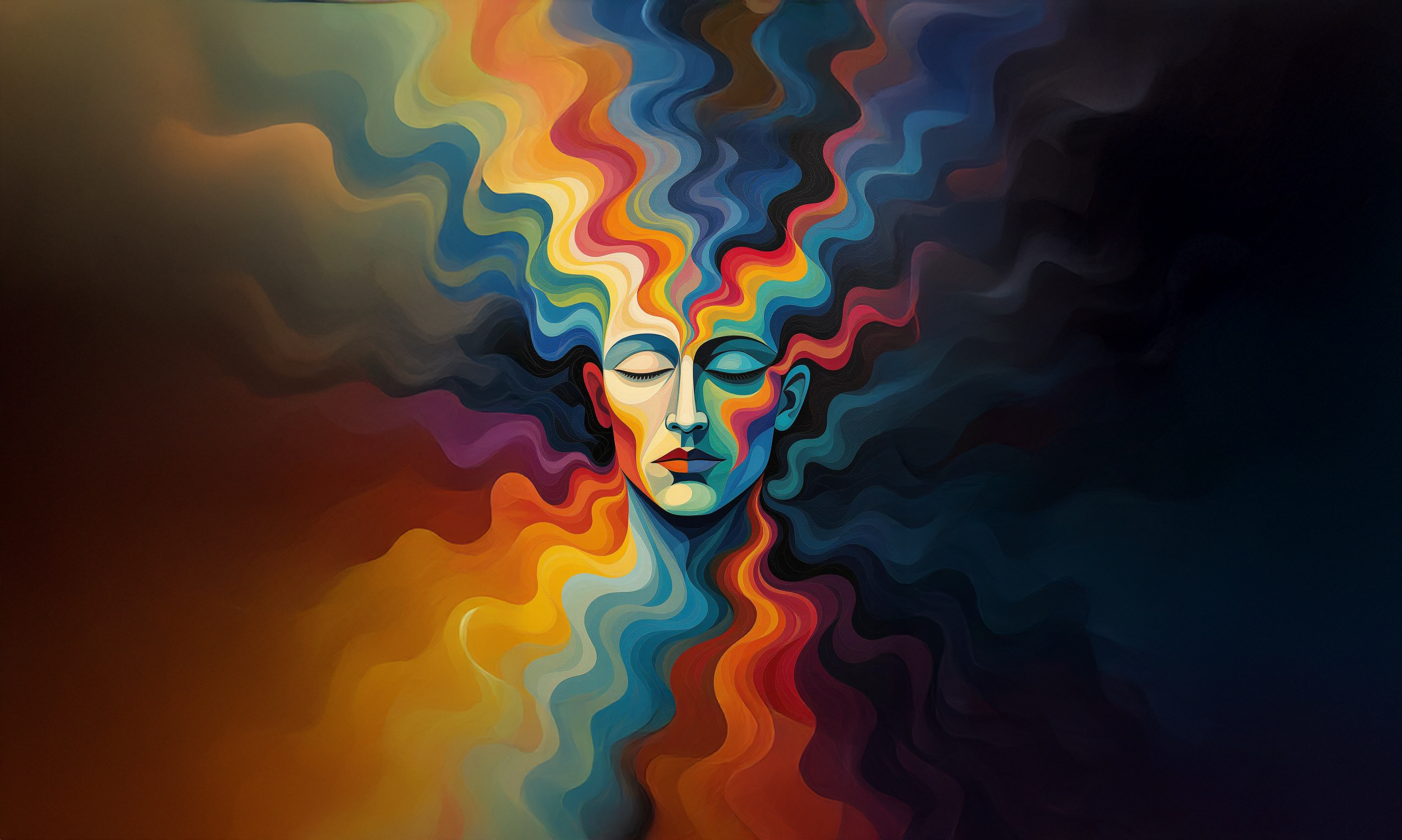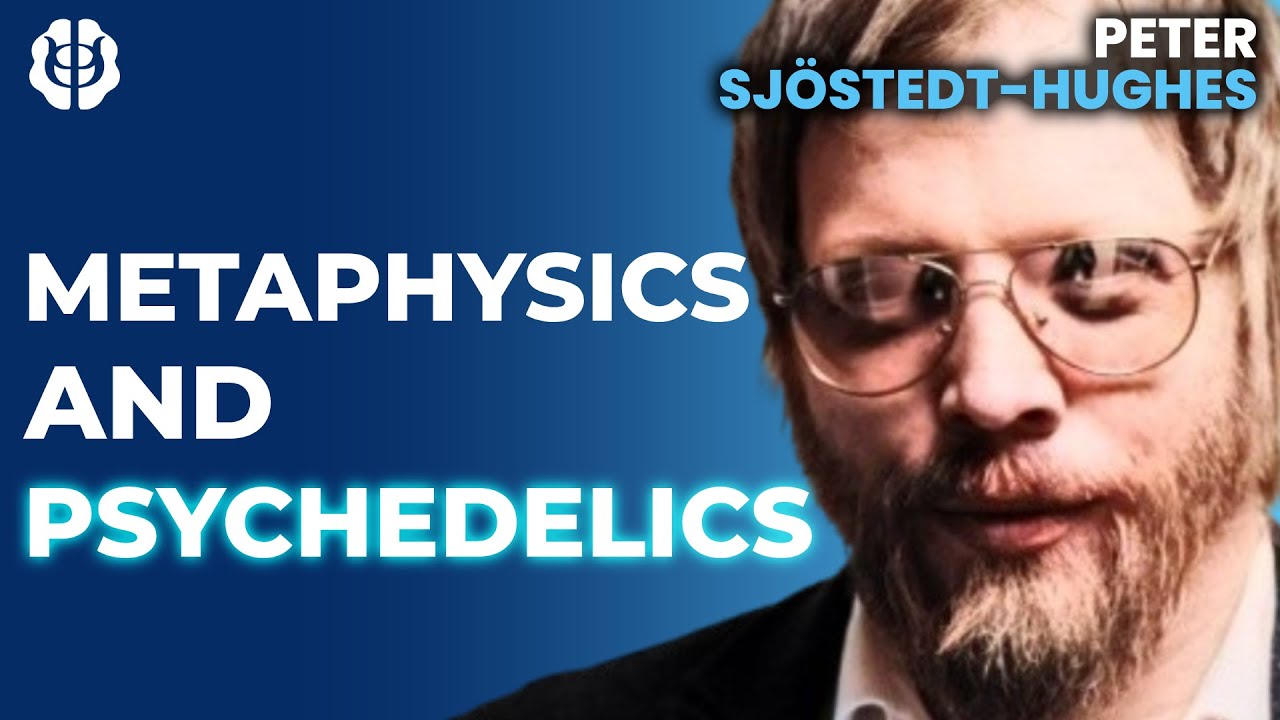The Mind-Body Problem: Exploring the Divide

The mind-body problem is one of philosophy's most enduring mysteries. How do our subjective experiences, our thoughts, feelings, and consciousness, relate to the physical matter of our brains and bodies? This question has plagued thinkers for centuries, sparking countless debates and diverse perspectives. In this blog post, we'll delve into the core of this problem, explore prominent viewpoints like dualism and materialism, and venture into the intriguing realms of idealism and panpsychism. We'll also examine the role of psychedelics in potentially illuminating the nature of consciousness, a topic we recently explored in depth with philosopher Peter Sjöstedt-Hughes. You can listen to our full conversation with Peter on this topic by clicking here.
Defining the Mind-Body Problem
At its core, the mind-body problem grapples with the relationship between mental phenomena and physical phenomena. On one hand, we have our subjective experiences – the redness of red, the pain of a stubbed toe, the joy of listening to music. These are qualitative, private, and seemingly non-physical. On the other hand, we have the physical world – brains, neurons, electrical signals, and chemical reactions. These are objective, measurable, and governed by physical laws. The challenge lies in explaining how these two distinct realms are connected. How can physical processes give rise to subjective experience? Or, conversely, how can our thoughts and intentions influence our physical actions?
Dualism vs. Materialism: A Philosophical Showdown
Two of the most prominent and opposing positions in the mind-body debate are dualism and materialism.
Dualism
Dualism, famously championed by René Descartes, posits that the mind and body are fundamentally distinct substances. The mind, according to Descartes, is a non-physical, thinking substance (res cogitans), while the body is a physical, extended substance (res extensa). This raises the crucial question of how these two separate substances interact. Descartes proposed that the pineal gland in the brain served as the point of interaction, but this explanation has been widely criticized for its lack of scientific plausibility. Other forms of dualism, such as property dualism, suggest that while there is only one substance (matter), it possesses both physical and mental properties, which are irreducible to one another. Despite its intuitive appeal to some, dualism faces significant challenges in explaining the causal relationship between mind and body without violating fundamental physical laws.
Materialism
Materialism, in contrast, asserts that everything, including the mind, is ultimately physical. There is no separate mental substance; mental states are simply physical states of the brain. Different forms of materialism offer varying explanations of how this works. Eliminative materialism goes so far as to claim that mental terms like "belief" and "desire" are folk psychology concepts that will eventually be replaced by more accurate neuroscientific descriptions. Reductive materialism attempts to reduce mental states to specific brain states, arguing that each mental state can be mapped onto a corresponding physical state. Functionalism, a more nuanced form of materialism, focuses on the functional roles of mental states. It argues that a mental state is defined not by its specific physical makeup but by its causal relations to inputs, outputs, and other mental states. While materialism offers a more parsimonious account of the mind-body relationship than dualism, it struggles to fully explain the subjective, qualitative nature of consciousness, often referred to as qualia.
Exploring Idealism and Panpsychism
Beyond dualism and materialism, other perspectives offer alternative frameworks for understanding the mind-body problem.
Idealism
Idealism proposes that reality is fundamentally mental or spiritual. In its purest form, idealism suggests that the physical world is merely a manifestation of mind or consciousness. George Berkeley, a prominent idealist, famously argued that "to be is to be perceived" (esse est percipi), implying that objects exist only insofar as they are perceived by a mind. While idealism can elegantly address the problem of how consciousness arises (because it is the foundation of reality), it faces challenges in explaining the apparent objectivity and regularity of the physical world. How can individual minds collectively construct a consistent and predictable reality?
Panpsychism
Panpsychism offers a middle ground between materialism and idealism. It suggests that consciousness, or at least some form of proto-consciousness, is a fundamental property of all matter. This doesn't mean that rocks are thinking and feeling in the same way humans are, but rather that even the most basic physical entities possess some minimal degree of awareness. Panpsychism attempts to solve the hard problem of consciousness by avoiding the need to explain how consciousness emerges from non-conscious matter. Instead, it posits that consciousness has always been present, albeit in varying degrees of complexity.
Consciousness: What Are We Really Talking About?
The debate surrounding the mind-body problem often hinges on the definition of consciousness itself. What exactly are we trying to explain? David Chalmers famously distinguished between the "easy problems" and the "hard problem" of consciousness. The easy problems involve explaining cognitive functions such as attention, memory, and self-awareness. These problems, while complex, are amenable to scientific investigation. The hard problem, on the other hand, concerns the subjective, qualitative experience of consciousness – the "what it's like" aspect. How do physical processes give rise to subjective feelings, sensations, and thoughts? This is the core challenge that continues to elude a satisfactory explanation.
Spinoza, Whitehead, and Panpsychism
Several philosophers have contributed significantly to the development of panpsychist and related ideas. Baruch Spinoza, with his concept of Substance monism, argued that there is only one substance, which he called God or Nature. This substance possesses both mental and physical attributes, which are two ways of perceiving the same underlying reality. Alfred North Whitehead, a 20th-century philosopher, developed a process philosophy that views reality as a dynamic flow of events, each with its own subjective experience. Whitehead's "actual occasions" are the fundamental units of reality, and each occasion possesses a degree of feeling and responsiveness. These ideas have been influential in contemporary discussions of panpsychism, as they provide a framework for understanding how consciousness can be distributed throughout the universe.
Analytic Idealism: Kastrup's Perspective
Bernardo Kastrup's analytic idealism presents a modern and rigorous defense of idealism. Kastrup argues that consciousness is the fundamental reality, and the physical world is a manifestation of consciousness through a process similar to dissociation. He uses mathematical models and thought experiments to support his view, drawing on ideas from quantum mechanics and information theory. According to Kastrup, the universe is a single, unified field of consciousness, and individual minds are like whirlpools or localized patterns within this field. This perspective offers a compelling alternative to both materialism and traditional dualism, providing a coherent framework for understanding the relationship between mind and matter.
Naive Realism: What We Perceive is Real?
Naive realism is the intuitive belief that we perceive the world directly as it is. It assumes that our senses provide us with an accurate and objective representation of reality. However, this view faces challenges from both science and philosophy. Sensory illusions, for example, demonstrate that our perceptions can be distorted and unreliable. Moreover, neuroscience has shown that our brains actively construct our experience of reality, filtering and interpreting sensory information. While naive realism may seem appealing in its simplicity, it fails to account for the complex and mediated nature of perception.
The Role of Psychedelics in Understanding Consciousness
Psychedelics, substances that alter perception and cognition, have long been of interest to philosophers and scientists studying consciousness. These compounds can induce profound changes in subjective experience, often leading to altered states of consciousness that challenge our ordinary understanding of reality. Some researchers believe that psychedelics can provide valuable insights into the neural correlates of consciousness and the relationship between brain activity and subjective experience.
Peter Sjöstedt-Hughes on the Philosophy of Psychedelics
Peter Sjöstedt-Hughes is a leading voice in the philosophy of psychedelics. He argues that these substances can offer unique perspectives on the nature of consciousness, reality, and the self. Sjöstedt-Hughes draws on the work of philosophers like Nietzsche, Bergson, and Whitehead to develop a philosophical framework for understanding the psychedelic experience. He suggests that psychedelics can temporarily dissolve the boundaries of the ego, allowing us to access deeper levels of consciousness and connect with the world in new and meaningful ways. During our podcast conversation, he highlighted how psychedelics are not simply tools for escapism, but potential catalysts for profound personal and philosophical transformation.
Psychedelic Research: Evidence and Insights
Recent scientific research has begun to explore the therapeutic potential of psychedelics for treating mental health conditions such as depression, anxiety, and PTSD. Studies have shown that psilocybin, the active compound in magic mushrooms, can produce significant and lasting improvements in mood and well-being. Brain imaging studies have revealed that psychedelics can alter brain activity in ways that may promote neuroplasticity and emotional processing. While the mechanisms of action are not fully understood, these findings suggest that psychedelics may have a powerful impact on the brain and the mind.
Psychedelics and Altered States of Consciousness
Psychedelics can induce a wide range of altered states of consciousness, including visual hallucinations, changes in perception of time and space, and feelings of unity and interconnectedness. These experiences can be both profound and challenging, often leading to insights about the nature of reality and the self. Some researchers believe that psychedelics can temporarily disrupt the default mode network (DMN), a brain region associated with self-referential thought and ego identity. This disruption may allow for new patterns of thinking and feeling to emerge, leading to transformative experiences.
Metaphysical Shifts and Consensus Reality
The psychedelic experience can sometimes lead to a shift in one's metaphysical worldview. Individuals may question their assumptions about the nature of reality, the meaning of life, and the relationship between mind and matter. Psychedelics can challenge our sense of "consensus reality," the shared set of beliefs and assumptions that we typically take for granted. By temporarily disrupting these beliefs, psychedelics can open the door to new ways of seeing the world and our place in it.
Exogenous Mind Theory: Expanding the Boundaries of Mind
Exogenous Mind Theory, a concept explored by Peter Sjöstedt-Hughes, proposes that the mind is not solely confined to the brain but can extend beyond the individual, encompassing external objects, environments, and even other minds. This theory challenges the traditional view of the mind as a self-contained entity, suggesting that our thoughts, feelings, and experiences are shaped by our interactions with the world around us. Exogenous Mind Theory draws on ideas from ecological psychology, embodied cognition, and extended mind theory to argue that the mind is a dynamic and distributed system that is constantly evolving and adapting to its environment.
Free Will: Does It Exist?
The mind-body problem is closely related to the question of free will. If our mental states are simply the result of physical processes in the brain, then do we truly have free will, or are our actions predetermined by physical laws? This is a complex and long-standing debate with no easy answers. Determinism argues that all events, including human actions, are causally determined by prior events. Compatibilism attempts to reconcile free will with determinism, suggesting that we can be both free and determined. Libertarianism, on the other hand, asserts that we have genuine free will and the ability to make choices that are not causally determined. The question of free will remains a central challenge for both philosophy and science.
Panpsychism Revisited
Returning to panpsychism, it's important to acknowledge the criticisms leveled against it. Some argue that it's unfalsifiable, meaning there's no way to prove or disprove it empirically. Others question how individual units of consciousness can combine to form the complex consciousness of a human being – the "combination problem." Despite these challenges, panpsychism continues to attract attention as a potential solution to the hard problem of consciousness, offering a way to bridge the gap between the physical and mental realms.
Conclusion: Reflections on the Mind-Body Problem and Beyond
The mind-body problem remains a profound and multifaceted challenge, one that has captivated philosophers and scientists for generations. While no single solution has emerged, the ongoing exploration of this problem has led to valuable insights into the nature of consciousness, reality, and the self. From dualism to materialism, idealism to panpsychism, each perspective offers a unique lens through which to view the relationship between mind and matter. And as we discussed with Peter Sjöstedt-Hughes in our recent episode, exploring altered states of consciousness through psychedelics can potentially offer new avenues for understanding these complex issues. Ultimately, the pursuit of understanding the mind-body problem is a journey that pushes us to question our fundamental assumptions about the world and our place within it.








